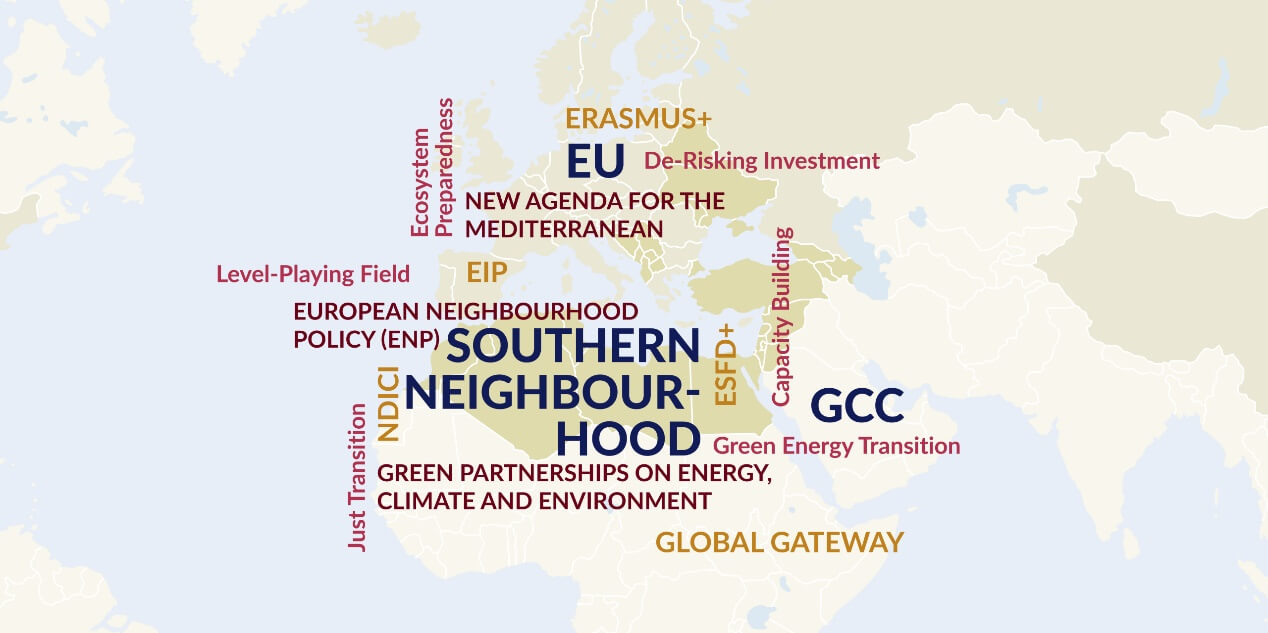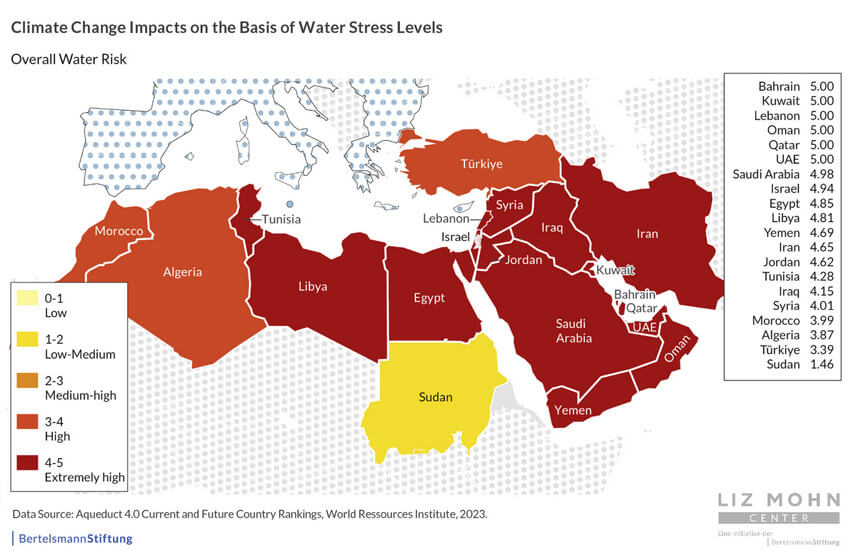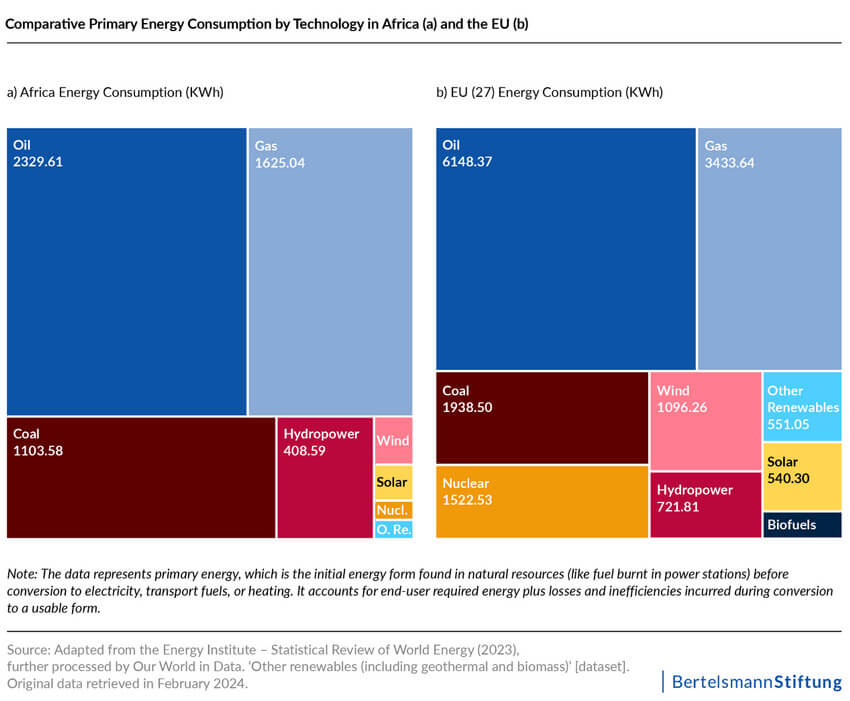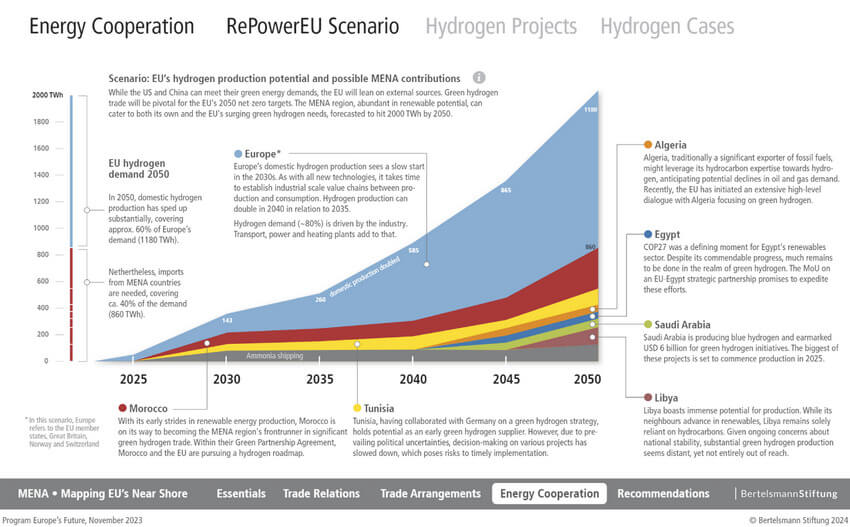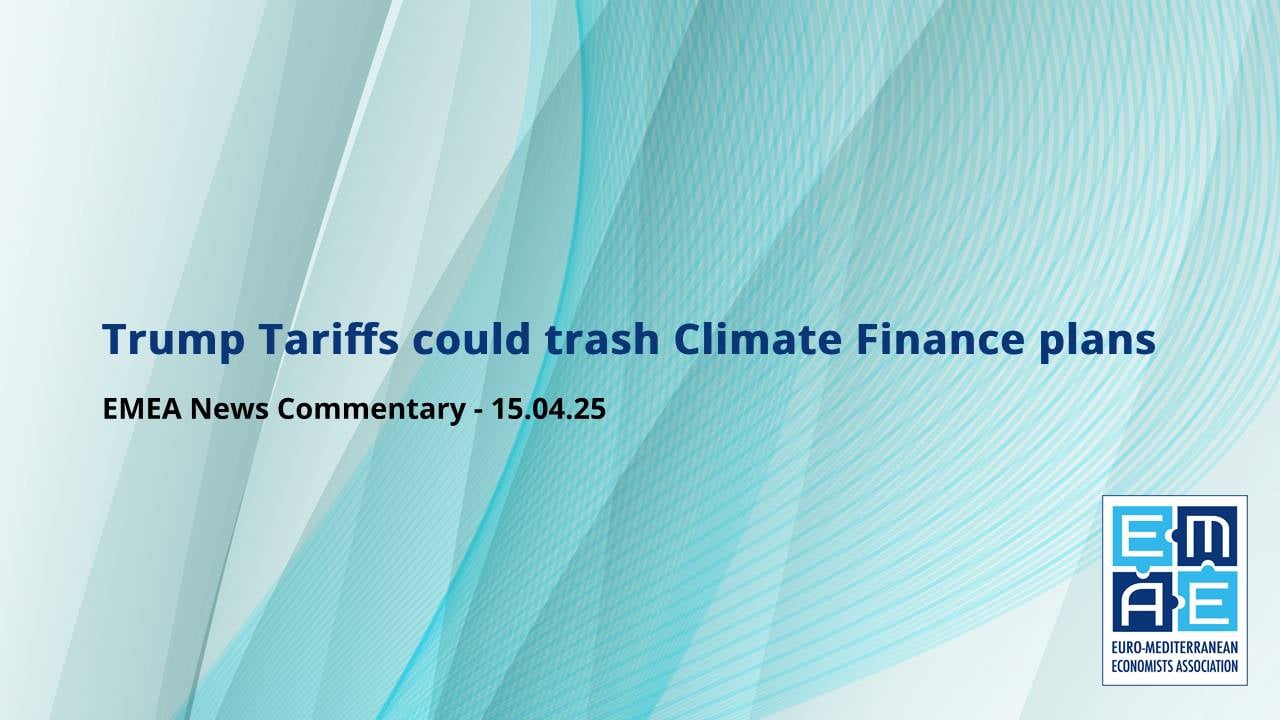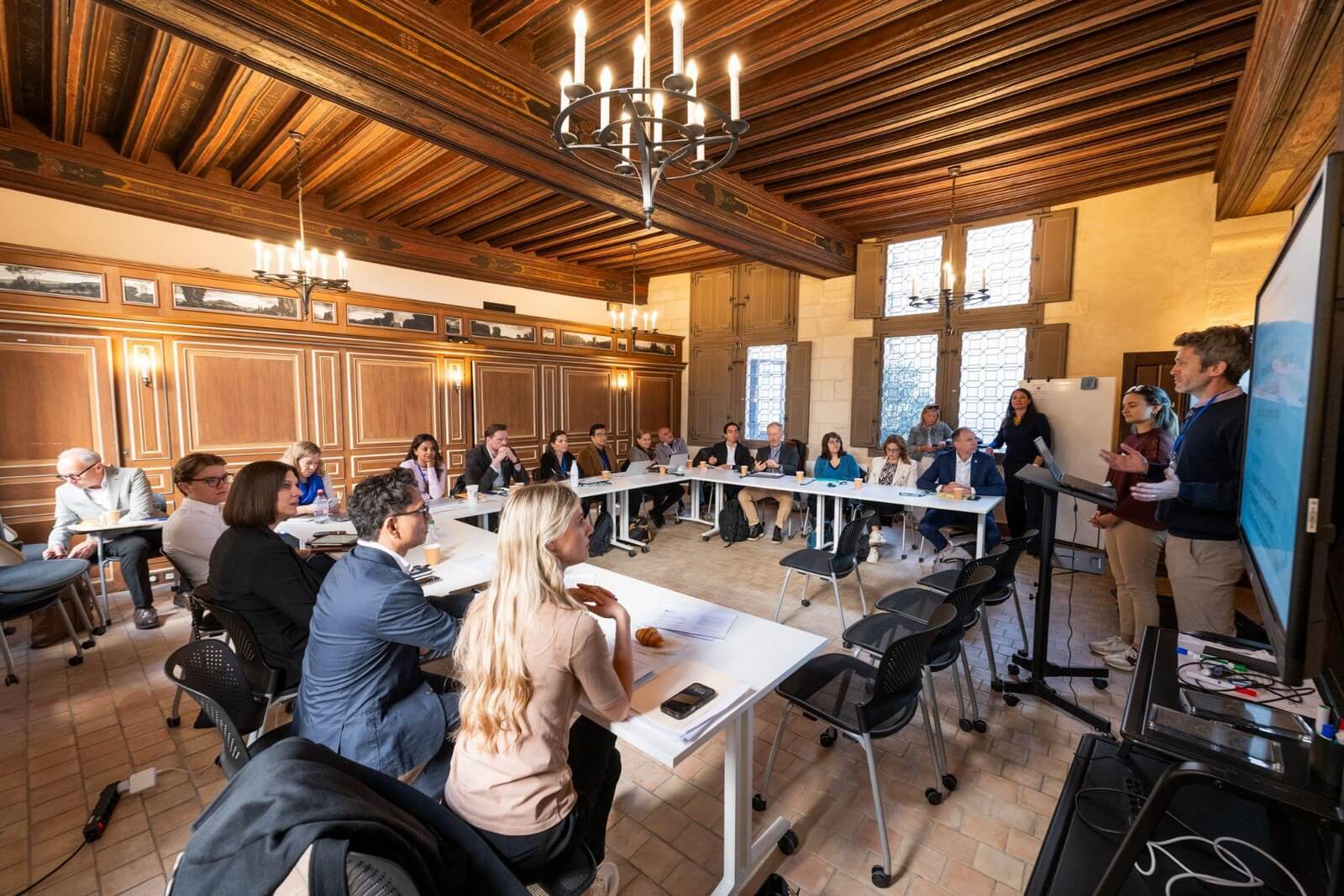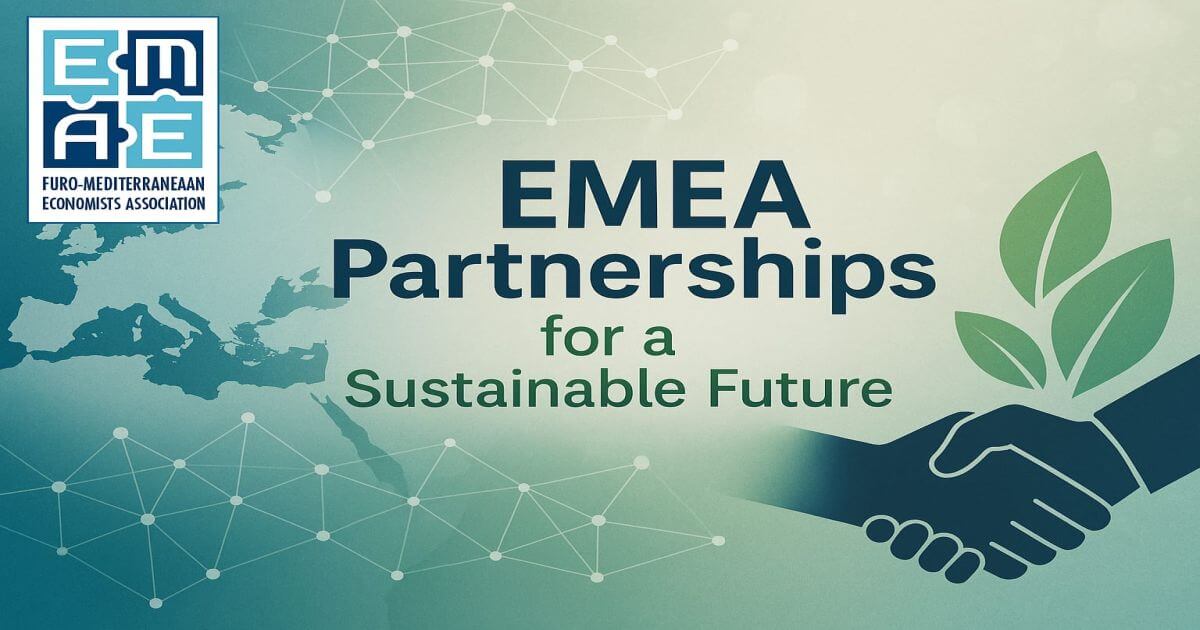Economic, social and political relations between Europe and its Southern Neighbourhood are important – despite ongoing conflict across the Middle East and North Africa (MENA) region – but green energy partnerships could bring myriad benefits for all stakeholders.
Climate change has severely affected the entire region around the Mediterranean in particular. Heat waves and water insecurity are having a serious impact on societies and economies. Joint green energy production projects can increase trans-Mediterranean trade potential, as most countries are on a path of economic growth despite adverse local conditions.
Heat and water shortages are especially noticeable around the Mediterranean, which includes the EU’s southern member states, as well the southern neighbouring countries of the MENA region. Across this vast and important area, it is too hot, too dry and becoming more prone to extreme weather events. People are realising that energy production and consumption in the economy and society must switch from traditional fossil fuels to sustainable natural sources, such as sun and wind.
A new joint study by the Bertelsmann Stiftung’s programme “Europe’s Future” and the Euro Mediterranean Economists Association – EMEA, entitled “Strengthening EU-Southern Neighbourhood Relations – The Imperative of Equal Partnerships in the Green Energy Transition” highlights the central role of cooperation between the EU and its direct southern neighbours – from Morocco to Jordan – in the field of green energy as a transformative way to strengthen bilateral relations.
The study emphasises the EU’s geopolitical imperative to bolster its ties with the MENA region, to counter the growing influence of Russia and China.
By prioritising equitable green energy initiatives, both regions can make economic and societal progress, save the environment, reshape their energy landscapes – and foster partnerships based on mutual respect and shared social and economic advancement.
The Energy Transition is Challenging but Manageable
We advocate for an approach centred on equity, ensuring the renewable energy transition addresses the EU’s environmental and energy security needs, while catalysing economic development and sustainability in the Southern Neighbourhood.
Collaborative efforts around the Mediterranenan are needed for technology transfer, capacity building and innovative financing mechanisms to create a resilient and sustainable energy infrastructure that benefits both regions. Our study’s recommendations provide a roadmap for a fair and cooperative green transition. The focus is on regional interconnectivity, de-risking investment and, crucially, a just and social transition.
Addressing Disparities, Promoting Equality
The transformation of energy production needs from oil, gas and coal to clean energy sources is a huge joint challenge. Green technology can mitigate existing disparities across the Mediterranean in emissions and access to capital to help enable a fair transition to renewable energy.
Taking the different levels of green transition within the Southern Neighbourhood, into consideration, we propose a strategy that benefits the EU and MENA regions by advancing the green energy transition through equitable partnerships. Such proposed partnerships would range from financial and technology cooperation to safeguarding the natural and social environment.
Finance and Markets: Strengthen Tools and Coordination
The EU has a wide range of funds, plans and mechanisms that can make a genuine difference, such as Neighbourhood, Development and International Cooperation Instrument – Global Europe (NDICI), European Fund for Sustainable Development Plus (EFSD+), Global Gateway, and the Economic Investment Plan for the Mediterranean (EIP). These tools must be transparent and accessible to all stakeholders, with improved coordination between EU institutions and member states.
For example, the EIP can act as a catalyst for investment, with a focus on strengthening regulatory frameworks to encourage private sector engagement and ensuring transparent regulation in accessing and monitoring funds and projects.
The Green Energy Transition Requires Private Capital
The private sector can best be involved when green energy transition projects serve export and import needs and create a market. Existing plans should involve philanthropic players and international private corporations that specialise in energy. Enhanced cooperation among international players, including multilateral development banks (MDBs), is integral to maximising benefits.
Rather than, for example, extending short-term budget support to Southern Mediterranean Partner Countries, the EU could provide targeted funding linked to progress in renewable energy development. This approach guarantees predictable export revenues for the MENA region and supports the decarbonisation efforts across EU and MENA economies. In this way, green energy could become a real catalyst for EU-MENA trade relations.
Green hydrogen is one field of emission-free energy production with enormous potential. Trade in green hydrogen will be pivotal for the EU’s 2050 net-zero targets. Meanwhile, the MENA region, abundant in renewable potential, can cater to its own and the EU’s surging green hydrogen needs.
Egypt and Morocco are the region’s renewable energy frontrunners, but few projects evolve from project plans. This is because real business cases are needed to mobilise private investments and interconnectivity links have to be created or upgraded. In addition, the first running hydrogen plants show that beyond investments, local social responsibility, skilled workers, sophisticated technology and clever water management are all required.
Foster Innovation, Capacity Building and Knowledge Sharing:
To ensure a new era of innovation and progress, Europe and its neighbours could launch initiatives within existing frameworks, such as ERASMUS+, to bolster green skills, facilitate educational exchanges and transfer knowledge. This includes developing joint research programmes, technology-sharing agreements and educational collaborations to align workforce development with the needs of the green energy sector.
Other programmes, including the Partnership for Research and Innovation in the Mediterranean Area (PRIMA) and Horizon Europe, could be expanded to address the Mediterranean’s energy transition needs.
Technology providers, research institutions and universities can facilitate the flow of renewable energy technologies into the region. This includes setting up innovation hubs, providing technical training and supporting joint ventures between local and international companies. Bilateral EU-Southern Neighbourhood country partnerships, such as the EU-Morocco Green Partnership, can serve as powerful tools for enforcing these essential expansions.
A Just transition Includes Local Communities
Local and indigenous communities should equitably benefit from green projects. This means policies should involve those communities throughout the entire green project lifecycle. Formal platforms for engagement can be created, including guaranteed consultations for all energy-related policymaking. These consultations should be culturally appropriate, accessible and transparent, incorporating the knowledge and perspectives of local communities.
Policies should stress local and social responsibilities. To do this means recognising and upholding the traditional rights of local and indigenous communities to access and manage natural resources. It is vital to ensure that green projects do not displace communities or restrict their access to vital resources.
Roadmap for a Fair and Cooperative Energy Transition
By redefining relationships through equitable green energy cooperation, the EU and its Southern Neighbourhood can transform their energy landscapes, their political, trade and socio-economic interactions. This partnership, grounded in mutual respect and shared benefits, is essential for achieving climate neutrality and energy security. This study provides a roadmap for a fair and cooperative green transition, emphasising sustainable development and mutual prosperity.
Joint green energy production projects can increase trans-Mediterranean trade potential, Most Arab countries, as well as Israel and Turkey, are on a path of economic growth, despite of adverse local conditions, conflicts and wars. Once these challenges are solved, even more potential for green energy production and trade can be unlocked.
Read more on:
Matching EU-MENA Trade Relations to the Green Economic and Social Transition Starts at COP28 (globaleurope.eu)
Green Partnership Agreements – How They Advance the EU Green Deal and Strengthen EU Relations with its Southern Neighborhood
Keeping Friends Closer: Why the EU Should Address New Geoeconomic Realities and Deepen Partnerships with its Neighbours
About the authors:
Christian Hanelt – Senior Expert Europe, Neighbourhood and the Middle East, Bertelsmann Stiftung
Professor Rym Ayadi – Founder and President of the Euro-Mediterranean Economists Association (EMEA), a Barcelona-based regional think-tank that serves as a leading independent and innovative policy research institution. www.rymayadi.com


